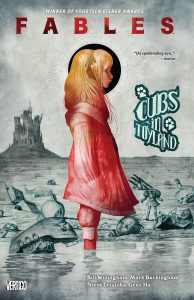 Someday, I will write a review that does not start off discussing how far behind I am and how that’s highly unlikely to change. Today is certainly not that day, in that, at the end of a week of work, I got maybe halfway through my list of tickets once, and I’m positive that a lot of them are waiting on me to do work to proceed. Which is why I never read, which is why I’m actually not very far behind, or wouldn’t be if I hadn’t been on a long drive that included finishing an audiobook. But this is not about that.
Someday, I will write a review that does not start off discussing how far behind I am and how that’s highly unlikely to change. Today is certainly not that day, in that, at the end of a week of work, I got maybe halfway through my list of tickets once, and I’m positive that a lot of them are waiting on me to do work to proceed. Which is why I never read, which is why I’m actually not very far behind, or wouldn’t be if I hadn’t been on a long drive that included finishing an audiobook. But this is not about that.
As you will no doubt remember, most of my graphic novel reading lately has been Fables, for the purpose of getting caught up to the Unwritten / Fables crossover of 2015[1], in case there are any spoilers. Which there probably won’t be anyway, but why would I voluntarily do that to myself? So now I’ve ready Cubs in Toyland, which gets me to only a year and a half behind where I need to be. Cool?
This is an interlude book for the majority of characters, since the most recent big bad remains thoroughly defeated and the traps he has set remain unsprung, and nor has any new big bad reared a head. But it is a critical book for the offspring of Bigby Wolf and Snow White. One of the seven has recently been named the new North Wind[2], and the others are at loose ends trying to figure out what they are meant to be. Which is all fine and good, until one of them is swept into a far darker version of the Babes in Toyland story than I would have expected.
It’s a good book, though, and I continue to care what happens. 18 volumes in, not counting 10 or more side books / spinoffs, that’s a pretty good record.
[1] I know. I know.
[2] Probably this is tangentially spoilery, so don’t read more if you care about that. (If you did care you’d be reading the books I expect, but.) Bigby is the son of the former North Wind, and he does not want the job, and also it is apparently a genetically inherited position. Thusly. Is the North Wind important? Man, I don’t know, but I will say that the Winds are pretty dang powerful / primal forces, even by Fable standards. So, now you know.
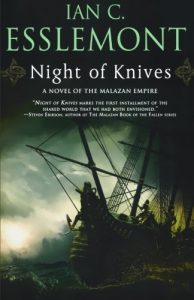 This is where the Malazan books get logistically weird. Because, see, Erikson had a fellow gamer partner back in the early ’80s or whenever they were building this world, which is ultimately my point, that the world builder behind the Malazan books is a they. And apparently the dividing line they have drawn is that Erikson writes about the Malazan Empire in decline[1], whereas Ian Esslemont writes about the Malazan Empire in ascension. Well, he does eventually. In a trilogy written later than this one.
This is where the Malazan books get logistically weird. Because, see, Erikson had a fellow gamer partner back in the early ’80s or whenever they were building this world, which is ultimately my point, that the world builder behind the Malazan books is a they. And apparently the dividing line they have drawn is that Erikson writes about the Malazan Empire in decline[1], whereas Ian Esslemont writes about the Malazan Empire in ascension. Well, he does eventually. In a trilogy written later than this one.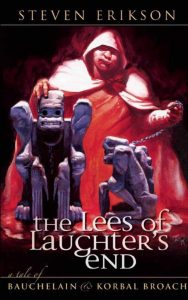 Well, this is incredibly annoying.
Well, this is incredibly annoying.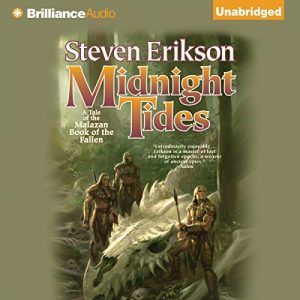 I feel like I have been listening to
I feel like I have been listening to 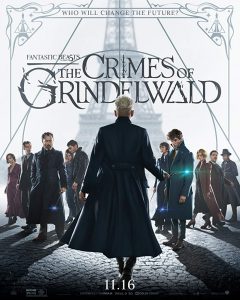 A thing to know about the Fantastic Beasts sequel is, it has no sympathy if you don’t particularly remember (or especially none if you didn’t see)
A thing to know about the Fantastic Beasts sequel is, it has no sympathy if you don’t particularly remember (or especially none if you didn’t see) 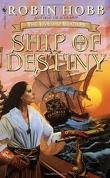 Considering how direly the trilogy
Considering how direly the trilogy 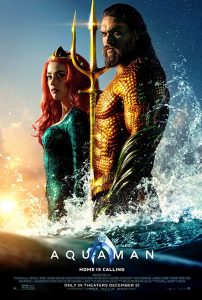 For once, my long delay in seeing a big event movie did not work against me! This is because, as nearly as I can tell, nobody else has actually seen
For once, my long delay in seeing a big event movie did not work against me! This is because, as nearly as I can tell, nobody else has actually seen 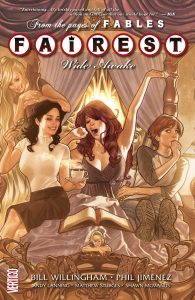 There’s another Fables series, apparently, which makes this I think the third spin-off? Fairest looks like it will be an anthology series focused on famous female fables, and I’m perfectly happy with that idea. (My first thought was, why can’t these stories just go in Fables instead, but I get that Willingham probably has some kind of master plan for where the plot is going. It has certainly been a plot-dense series to date! So I guess a spin-off is the only place to tell side stories.) At the same time… man, this is a lot of books.
There’s another Fables series, apparently, which makes this I think the third spin-off? Fairest looks like it will be an anthology series focused on famous female fables, and I’m perfectly happy with that idea. (My first thought was, why can’t these stories just go in Fables instead, but I get that Willingham probably has some kind of master plan for where the plot is going. It has certainly been a plot-dense series to date! So I guess a spin-off is the only place to tell side stories.) At the same time… man, this is a lot of books.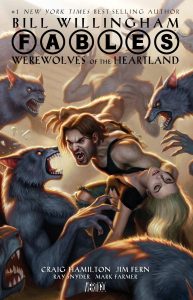
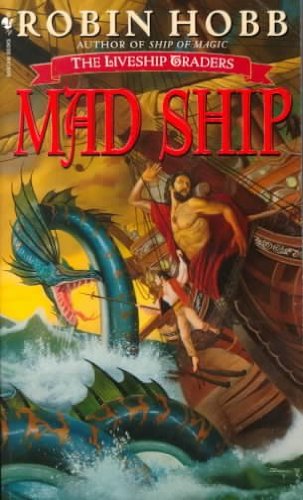 I’ve read another Robin Hobb book, which is nice because the book was nice!
I’ve read another Robin Hobb book, which is nice because the book was nice!